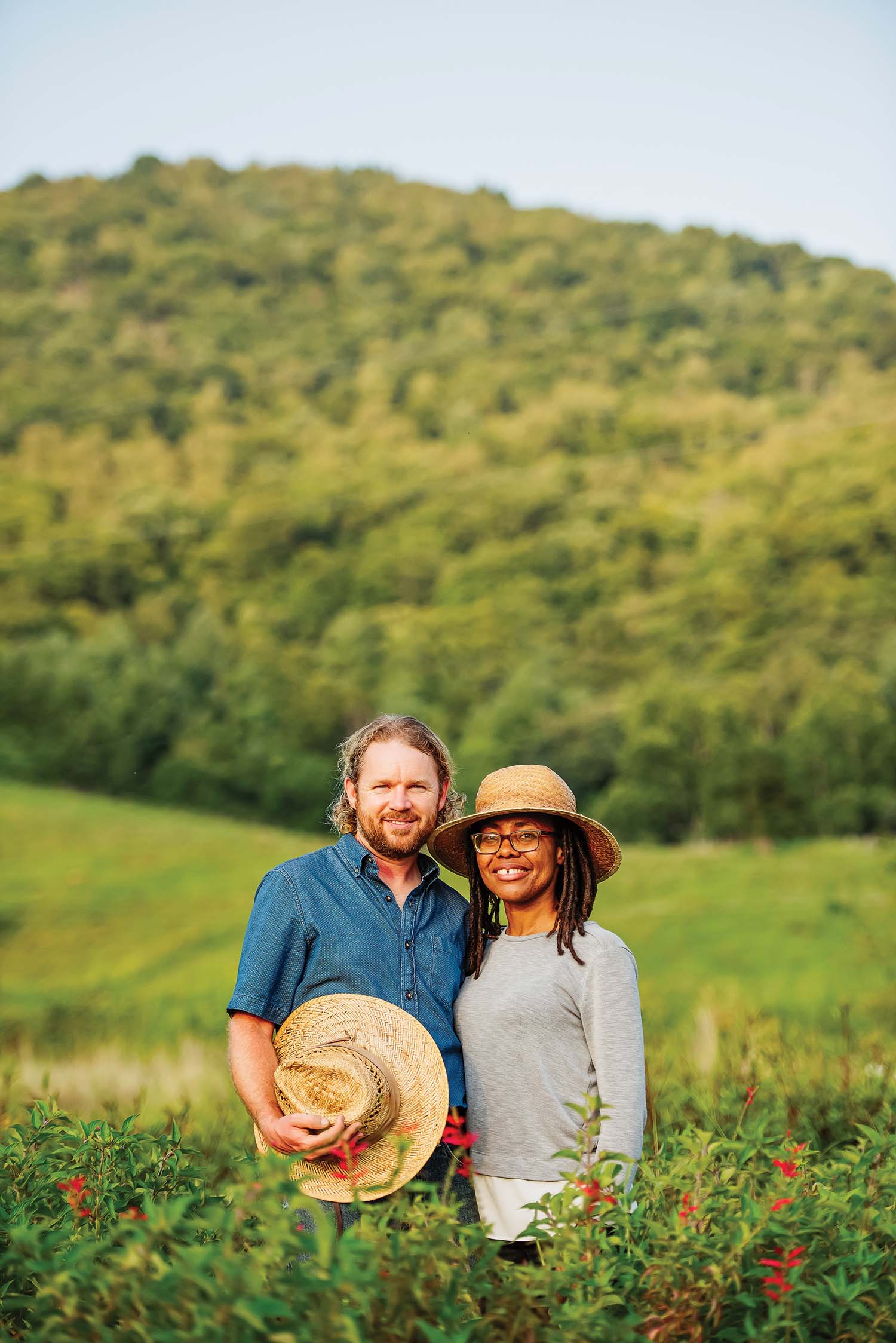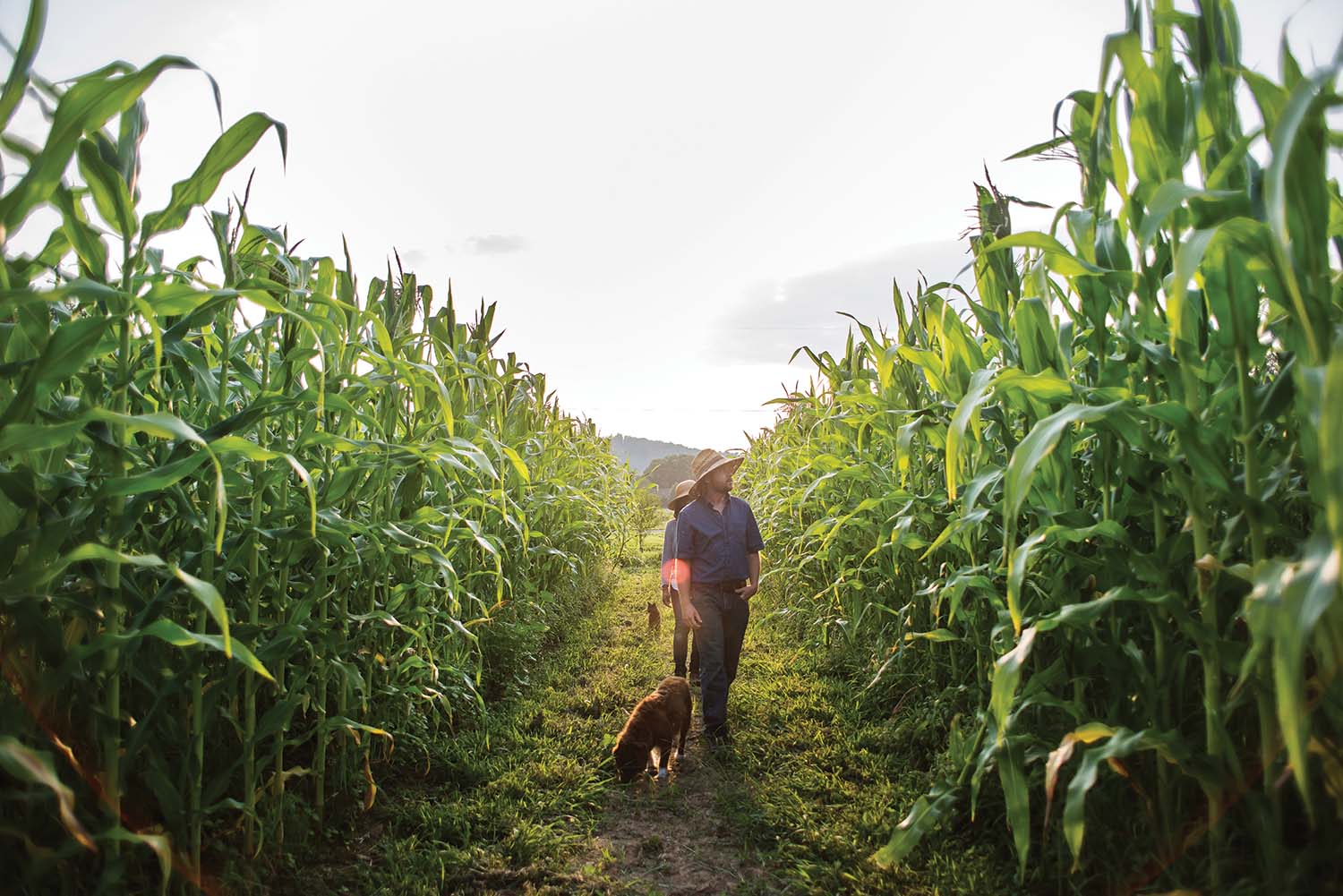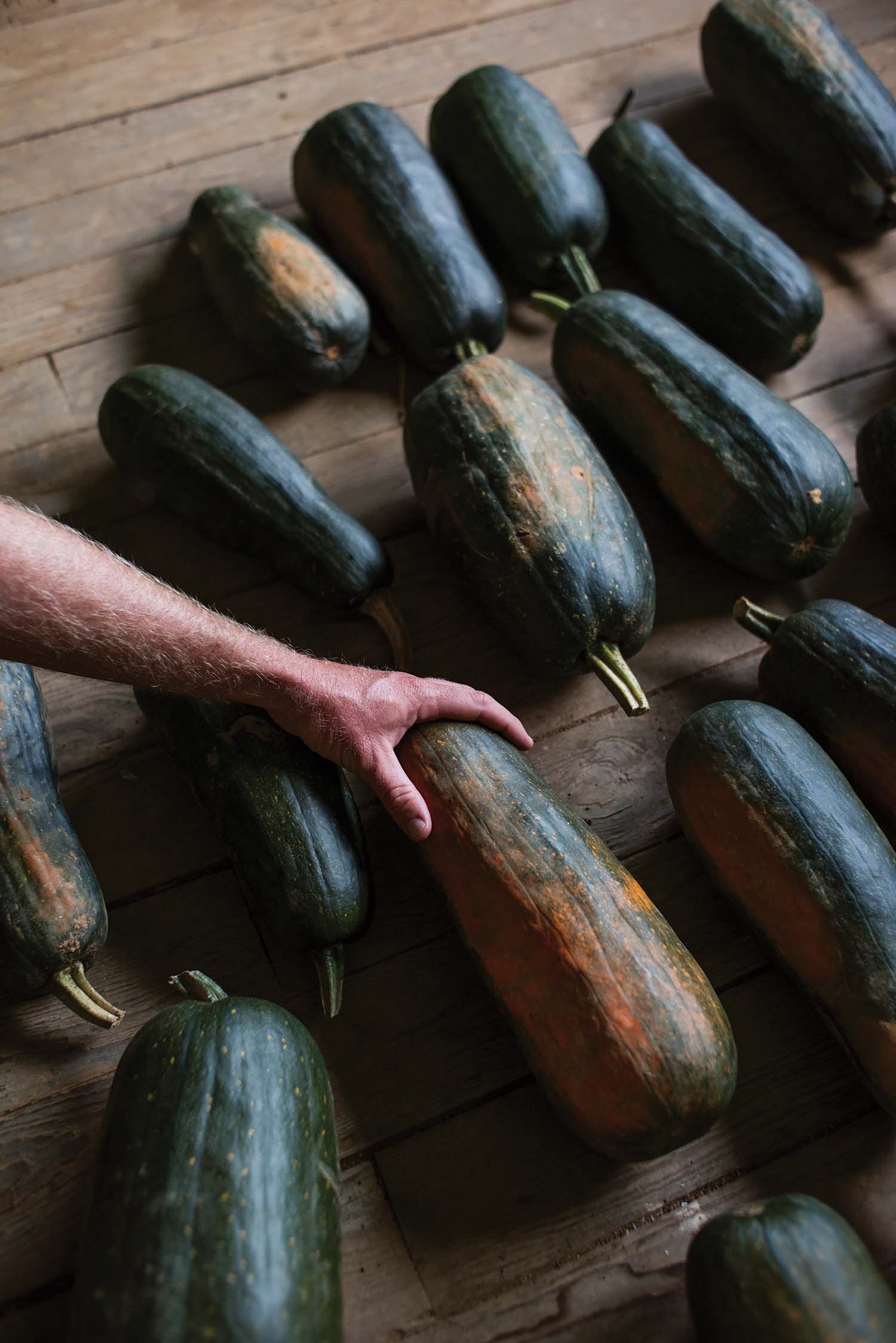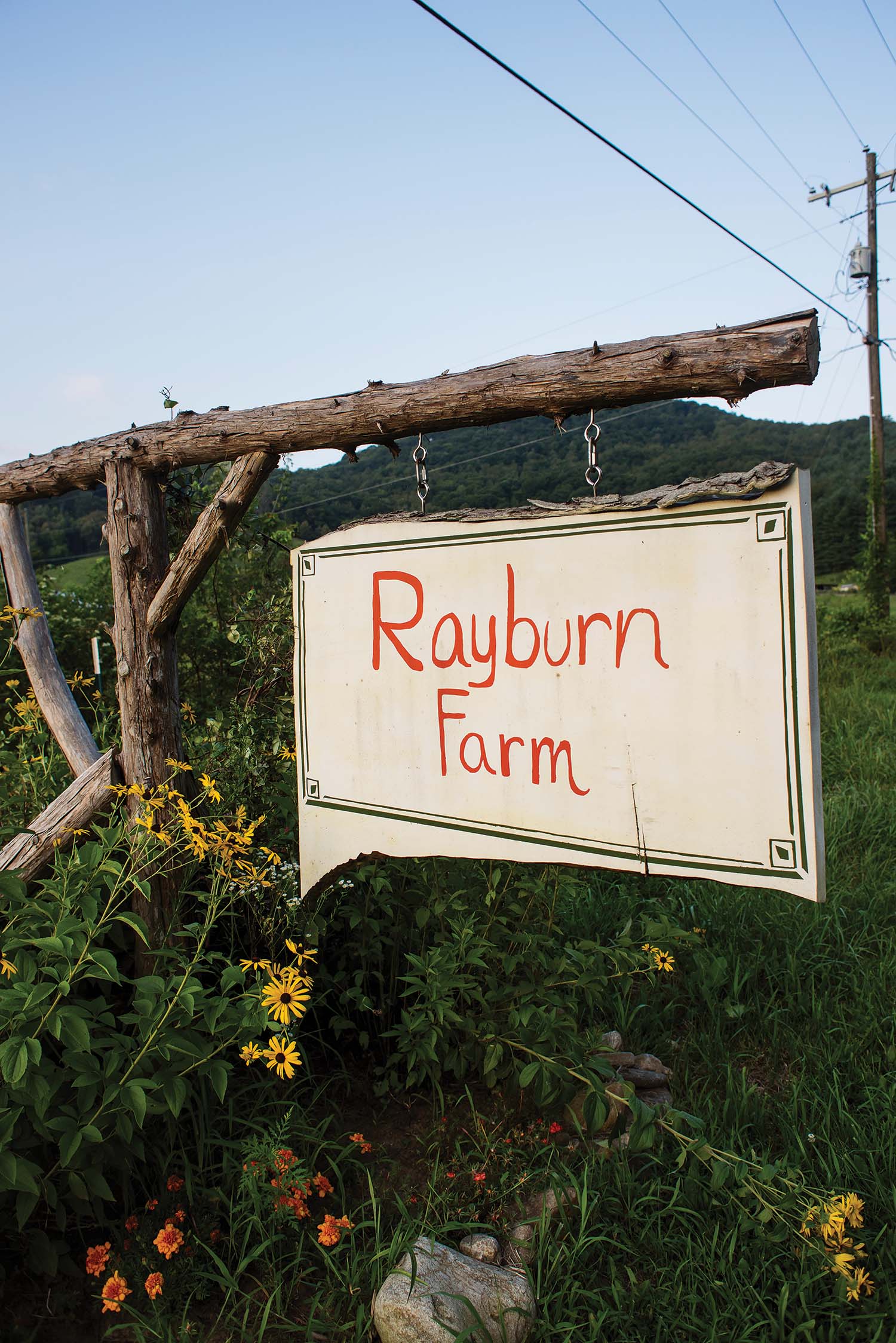
Photo by Jack Sorokin
The sturdy rural road that leads to Rayburn Farm in Barnardsville is like the purposeful, if serendipitous, path that led to Lauren and Michael Rayburn’s current family farming life. After building relationships with some of Asheville’s trendiest bistros and breweries, they’ve found themselves filling an important niche — raising specialty vegetables, herbs, and spices used in teas (peppermint, turmeric, ginger, etc.) and in artisanal/seasonal beers.
Barnardsville is a pristinely beautiful area in northwestern Buncombe County. The scheme might seem idyllic to those who embrace a dreamy Charlotte’s Web notion of farm life. But the couple will quickly disabuse romantics of this notion. At home with their six-year-old son Elijah, they work hard to fulfill their agricultural brand. They are not hobby growers.
Did you two fall into farming, or was it deliberate?
Michael Rayburn: Our experiences differed. Like many Americans, my grandparents grew up farming, but the next generation — my parents — wanted out. But I was drawn to it from age five. I always had my own garden wherever we lived. My family jokes that they knew I’d become either a smart-ass lawyer or a farmer. I ended up at North Carolina Agricultural and Technical State University [in Greensboro] for horticulture, where I met Lauren.

Photo by Jack Sorokin
Lauren Rayburn: I didn’t have much farming background. My grandparents moved from Louisiana and Mississippi to California before 1950, part of the Great Migration. My mom was a second-generation Los Angeleno. Dad moved there at 19. I’d say, too, that for formerly enslaved people whose history involves having to farm for no wages, there may be a desire to have distance from this way of life. My uncle was in finance and knew I was entrepreneurial. He latched onto the “out there” idea of waste management as a career path for me. North Carolina Agricultural and Technical State University (NC A+T) had a program, and I learned of an incredible opportunity with the Department of Agriculture that hinged on attending what are called 1890 Land Grant Institutions. [The second of two Morrill Acts authorized these science-and-agriculture schools in former Confederate states, requiring that students be enrolled regardless of race or else be admitted to separate land-grant colleges established for them.] I could get a full ride and guaranteed employment after college if I majored in an agriculture-related specialty.
So you jumped in …
Lauren: Everything aligned. I’d never been to North Carolina, but NC A+T was too good to pass up — I remain one of the only family members who left LA. We just don’t do that! I met Michael when I was president of the Environmental Science Club; he was president of the Horticulture Club. Neither club had members, really. We held a meeting, and the rest is history.
What then?
Michael: Lauren attended grad school in DC, and I worked for the National Arboretum. Our son Elijah was born, and I left my not-too-lucrative horticulture job to care for him. Lauren could work from anywhere, so moving was a no-brainer.
Lauren: We found our wonderful property, bought the farm in Summer 2013, and had our first growing season the next year.
Michael: We were cautious, bought the farm using our IRA as the down payment, and started the bare-bones business with $3,000.
You’ve found a sweet niche.
Michael: The breweries were accidental. I selected crops that required little attention as I cared for Elijah. We started with specialty potatoes, jack-’o-lanterns, and pie pumpkins. Through my arborist/horticulturist consulting work, I met Green Man’s specialty brewer Mike Kranowski. He wanted to do pumpkin beer with real pumpkins. When he told me most breweries used canned pumpkin puree, I couldn’t believe it: I was growing specialty pie pumpkins. I offered to dig a pit, and we roasted them over coals here — worked great. Wicked Weed’s Luke Dickinson then wanted a local Italian basil source for their Coolcucumber beer; that did well, too.
You sell to many breweries now.
Michael: Yes, 20+. As botanical beers got popular, Elijah and I walked into every brewery in town and asked what they’d want us to grow. Word got out and we connected with Asheville Tea Company. We provide peppermint for their “Mountain Mint” tea, and lime basil for their biggest seller, “G&Tea.”
Do you grow hops?
Michael: We don’t. Hops originated in Manchuria and thrive in much higher altitudes. Some varieties might perform here, but we like what we’re doing. Similarly, we don’t grow cardamom or saffron — why would I compete against a farmer in Iran, who’s mastered it?

Your business approach is innovative.
Michael: We were fortunate, did our research, built relationships, and got tremendous community support.
Lauren: And timing was everything. Plus, Michaeln we approach everything from a calmer perspective, we think more clearly and find workable solutions.
Michael: Right. My best tool is my hammock — even better than a hoe or tractor.
Is there pressure when growing for specific markets?
Michael: There’s pressure when a client needs 40 pounds of something by month’s end, but a good farmer must understand weather delays and other pitfalls that accompany working with a biological system. The food-and-beverage industry is volatile and hyper-competitive. Trends change — we try to be responsive.
Lauren: Buyers’ orders change, too, so we communicate often about when they’ll be ready.
What’s next for Rayburn Farms?
Lauren: We’re excited for our mid-October website launch, and we’ll begin selling baby ginger, turmeric, and some garlics online, and shipping domestically.
Advice for those wanting to live your dream?
Michael: You can do it, but be skeptical. Don’t believe the hype when people say you’re great, etc. At the end of the day, it’s about making a living, not having to live on Ramen noodles. Don’t let ego get in the way of good business relationships.
Lauren: We’re happy we don’t live on Ramen noodles.

Rayburn Farm, Barnardsville. Lauren and Michael will be at the Barnardsville Elementary Fall Festival on Saturday, Oct. 20, and at the WNC Fermentation Festival in Marshall on Saturday, Nov. 3. For more information, call 828-424-5109, check out the farm’s Facebook page, or see rayburnfarms.com
